- Getting around Lijiang. Dont stay in the Old Towns more than 2 days, there is nothing to do. KRISS Oct 9, 2013 05:46
- 2013 Beijing Temple Fair BENNYLAU Feb 26, 2013 03:29
- Malaysian traveling from KUL - LAX vis Shanghai PVG ZATI_DY Jan 3, 2013 20:15
<C> XiShuangBanna on Two Wheels
- Views: 10289
- |Vote: 0 0
- |Add to Favorites
- |Recommend to Friends
The City of Dawn
JingHong is a small town of about 13,000 and the capital of the XiShuangBanna region, the southernmost region of the Yunnan Province. XiShuangBanna comes from the Thai Sip Song Panna meaning "12 Rice Growing Districts". It is tropical in climate, host to rainforests and jungles; tigers, elephants, monkeys and (not to lump them in the same category) two thirds of the people in the region are ethnic minorities, one third of which are the Dai people. In the Dai language, JingHong means City of Dawn.
And it is. Streets are lined with palms. Architecture bears south-Asian hindu flavors: a little stupa here, some gold there, elephants, peacocks, and roof cornices with curvy-flame accents. Carts sell bamboo, sugar cane, fresh pineapple. Signs have traditional Chinese script as well as a loopy, cursive script...the Dai language which appears as a combination of Laotian and Thai. The weather is foggy in the morning, burning away to gorgeous heat in the afternoon, and buildings are mostly large terraces or porches with open walls and a roof overhead. You can wake up in this city and feel like you are in paradise: refreshed, alive, glowing.
JingHong to GanLanBa
After a leisurely breakfast at the Mei Mei Cafe we walked down the road to look for bicycles to rent for a 2-day bicycle journey around the villages and countryside on the Laos border. It took a few stops, but we found a place that had 3 bicycles available. One bicycle short, the adept saleswoman lured my friend Steve over to the snazzy motorbikes sitting in the shade on the sidewalk. Not to be ones to resist temptation, or to cower away from upping the adventure-scale a bit, we took a motorbike in lieu of another bicycle and decided to rotate turns on it throughout the day.
After a few check-ups and pre-rides, 2 of the bicycles weren't working properly, so the shop-owner went out and bought two brand-new bicycles, a move which seemed a bit surprising but we weren't going to complain. Geared up and revved-up, we set out south-eastwards along a narrow road that skirted the river.
City life fell away quickly and became decidedly sparse and rural. The road cut along one hillside and foothills rose up all around the Mekong river-valley. The hillsides were lush with foliage and farms--rice terraces cutting rings up the slopes; pineapple fields and palms; rubber-tree farms characterized by ruddy red foliage in amongst the green. The river was a wide, flat ribbon, mostly slow-moving but deep enough to carry ferrys along it. Houses were made of wood or brick with thatch or tar roofs, many on stilts. Some were simple brick rectangular long-houses. Many were a series of huts: one home for living in, one to house equipment and storage, one outhouse, etc. Chickens flitted about, pecking the ground, climbing over logs and under tables.
We stopped about 20 or so kilometers outside JingHong and brought our bikes to the sandy riverbank and relaxed while the sun sank in the sky. The rivers' wide banks appeared shallow enough to wade in but the water ran deeper and faster in the center. The red and green hillsides surrounded us, quiet and peace descending with the sun.
With an hour of daylight left, we arrived in GanLanBa, about 27 kilometers south-east of JingHong, very near the Laotian border. Women wore sarong/sari type skirts in bright shimmering colors with equally bright tops. The homes appeared much more South-Asian than Chinese: big trapezoidal roofs, wide and low, like a straw hat pulled low over the brow. Beams poked out below the roof, balancing the home on stilts, and within appeared airy, open rooms. Chinese here also sounds different: more hissing "s" sounds, more slip and glide. After learning the honking, "r-ish" version of Beijing Mandarin, it was hard to understand these people and be understood. The word four "si" and ten "shir" suddenly became homonyms "si" and "ssi". I got funny looks when I said I was a "lao shir" and they corrected me by telling me I was a "lao sii".
This region is the home of The Dai people. One of the Yunnan's largest minority groups, the Dai practice Hinayana Buddhism and have lived south of the Yangtze for over 2000 years. The colorful sarongs and head-scarves mark the traditional clothing of the Dai women. They raise their houses on stilts to keep off the damp earth, away from mosquitos and other nuisances, and also to protect their homes during flooding rains.
GanLanBa Market
We woke in the morning and went for a walk through GanLanBa's large local market. The morning was a typical tropical morning: hazy and foggy...but the serene fog of moisture, like dew waiting to fall. The market was a long, wide outdoor corral, people with their wares lined end to end, masses of shoppers everywhere and foodsellers practically underfoot. Touring the markets in any city or town one visits is a fantastic way to get a slice of local life: the people and how they interact; the food they grow and sell; who is selling what to whom. On the outsides of the corral were permanent shops selling housewares or hardware or other daily items and the center was three transient aisles of riotous color: the produce with its reds and greens and yellows and purples; the deeper hues of spices and chilis; the earthy tones of roots and funguses and sundries--all laid out in bountiful piles on tarps or exposed in rolled-down burlap sacks. The people added a further dimension of color: the women in their bright, shimmering sarongs and tops; old women with white cowl-like cloths wrapped around their head and others with brightly colored head-scarfs or a cream-colored one, triangular in shape, with a dark red pattern stitched through. We bought a bag of pears for our journey that day and continued through the market. Further along, live chickens and ducks sat with tied feet in woven bamboo cages (bird flu be damned!) and then the butchery tables followed with slabs of pork meat, cured pigs' snouts and hoofs, and sides of beef, staining everything an irony-red. Beyond the butchery was stall after stall of makeshift eating kiosks. People turning and kneading dough, filling dumplings, frying tofu, pulling noodles, boiling or frying all these staples with vegetable and pickled goods and chili and soy, serving them in broth or steaming in a bowl: a typical Chinese breakfast.
We wandered through the tail-end of the market and came out the other side and, at around eleven wandered into a deserted but welcoming garage of a restaurant for our own breakfast. Restaurants here operate without menus: you show up, have a look at the larder and the vegetables and the contents of the fridge to see what ingredients are available and then you pick out what you want and they cook it up for you.
We returned to the hostel to check out and I took the motorbike back through the town to photograph some buildings and streets and this mysterious looking, half-abandoned temple. I met up with the others on the far side of town and we found the river again and took the small ferry across to the town on the other side. We set off, hoping for an alternate route back to JingHong, but with no map, it was mostly guesswork. The town on the other side of the river was more rural, less developed, less accessed. Clusters of homes and small shops and restaurants. More trapezoidal-roofed stilted homes, airy and open, but sheltered.
Deeper into the Countryside
We asked directions from two boys on bicycles at a small roundabout and they pointed southward. It seemed counter-intuitive, but we followed their pointing, skinny arms down a road that wound south and then west, leaving the town behind and cutting a vein through vast farms and rubber-tree plantations; pecking through sparse homes and working families. The mountains to the south and west embraced the road closely, and those mountains were Laos and, a bit further west, Burma. We curved along their span, staying low in the valley, and wound north, passing farm after farm. We began to feel we were heading the right direction until we came to a small village and Tom, who had been on the motorbike, told us the paved road ended and turned to dirt. We asked a small group of people gathered around a table under the awning of a small shop if the road led to JingHong. It doesn't, they said, you have to go back. We were dismayed at having to cover the same mileage again, but it wasn't disappointing to get to see that landscape once more.
When we returned to town, we asked several people the way to JingHong. They all seemed to point toward the direction of the river, implying that the only way back was the way we had come before. When we arrived at the ferry landing, we asked one more woman in a shop, and she pointed two directions: one across the river, and the other northward, along a dirt road we hadn't seen before. She told us we could go the north route, but that it was unpaved the whole way. She mimed this by bobbing her head around. It took me a minute, but finally I understood: "Oh, it's unpaved!" I said, punctuating my unintelligible English (I don't know the word for unpaved in Chinese) with the mime of holding my arms in front of me as if gripping bicycle handles and jostling myself around. She laughed and said yes, yes. But it's 50 kilometers to JingHong on that road. The other road is 27, she said. It didn't take long for us to decide on "the road less traveled". We were still craven for more exploration. To wind along smaller roads. Smaller villages.
The dirt road followed the river for the first 10 or so kilometers and was pleasantly untrafficked and sparse. We bounced along together happily, giving Grace (the motorbike) a real workout. After an hour or so we found a narrow dirt track that led steeply down the bank toward the river, and it ended at a beach with a small ferry crossing. A stream that poured into the larger river separated our side of beach from another small embankment stitched with squares of crops: patches of differing shades of green, all at different heights. At one point a small woman emerged from the trees at the top of the bank to pick her way among the crops. She wore a deep purple sarong, a headscarf around her black hair and a woven basket on her back, and she bent over double to gather items into her satchel. By this time the light was halfway down the sky, shafts coming along the stream as if with the current, and suddenly a monk emerged across the stream, walking below the quilt of crops, a young boy in rolled-up pants and a t-shirt tagging along behind. The monk was no more than 16 years old, his head shaven, a long, thin bamboo staff in his hand. The pair stopped and took stock of us from across the stream, the boy chattering away, the monk in his ochre robes leaning quietly against his staff. They moved on slowly, the boy doggedly pacing behind the sedate, rythmic steps of the monk. They passed around the nose of the embankment and out of sight.
We ate our fruit and drank some water and by the time we had finished, the monk and the boy had come back into view, disappeared upstream, and then a few minutes later the two appeared on our side of the stream. The monk had abandoned his staff somewhere, but was completely dry. The boy, on the other hand, had soaked pant legs and one wet shirt sleeve. They kept their distance, watching us, but once we had gathered our things and began walking back up to the road, they followed us. Watching, not responding to our greetings, as if herding us along like a flock of wayward goats. They kept their vigil on us as we picked up our bikes and started off, trailing behind for a few paces until we had gathered too much speed and left them behind.
Complications on the Road
At this point the road left the river and wound inland, around foothills and farms, deeper into the land, more and more uphill. Within these intimate valleys, guarded by hills, we found stunning rice terraces and miniature villages. The rice terraces absorbed the afternoon light like green stained-glass, the terrace borders--long frames of mud--fused the fields together. Rice shoots are the tenderest green shade, and steeped in water they glowed amongst the deeper greens and browns within the valleys.
All the villages we rode through were clusters of traditional housing, quaint stilted trapezoidal-hats. We passed flocks of geese wandering around the road together; a herd of goats trotting along to the deep clang of the herders' bell; and pigs floundering in shady corners of mud. Every person we passed or who passed us had a smile, a wave, or a thumbs-up.
It was my turn on Grace as the sun slipped further into the folds of the mountains, and two in our group of 4 were nowhere to be found. I stopped at a crossroads, Tom close behind me, and we waited for the others. The light was draining from the sky rapidly and we still had 24 kilometers to cover before reaching the city. Where were Steve and Jane? We waited and waited and finally Tom brought out his cell phone and called up Steve. Steve answered almost immediately and said "Dude, my bike seat broke, get out your camera, we're coming!"
And almost at that moment a giant blue logging lorry came around the corner, and there was Steve, perched shotgun, Jane in the middle, and the bikes capping off a full load of logs on the back of the truck. The driver stopped and threw Tom's bike in with the others, wordlessly offering us a ride all the way to town now that darkness had fallen. Steve explained that the truck driver pulled over, and seeing they needed help, fixed Steve's bike in minutes, and then offered them a ride. After securing Tom's bike to the roof, it was decided that Jane and I would take the motorbike and the boys would hang in the cab with the logger. I secretly thrilled at this plan: I was excited at the prospect of riding in the darkness, Jane hanging on behind, like Che and his buddy puttering along the small deserted roads of South America. This fantasy began to play out pretty well, until it became pitch black out and oncoming traffic threw so much light in our faces and kicked up so much dust to make visibility less than nil. Frightened of going off the road and ending up bum over teakettle in a rice paddy somewhere, but also having way too much fun giggling and shrieking, blind and bouncing along, Jane and I weren't really prepared when Grace up and died without warning.
Back in the Saddle
After several futile attempts at restarting the motorbike, we sat under a sky full of stars and waited for the boys in the lorry to come along and help us. When they arrived, they had no more success than we did at starting the bike and it was soon discovered, with the help of Tom's flashlight, that Grace was out of gas. This oversight wasn't just female dim-wittedness at all things mechanical...the gauge read that a quarter tank still remained. But, never fear. Our Logger-Hero quickly proceeded to hail down each and every passing car or truck and asked if they were willing to give us petrol. Several attempts and a few harsh words later, our Hero was kneeling over a truck's gas tank, siphoning out a water-bottle full of gas.
Once ol' Grace had some juice, Steve took over driving in the darkness while I held on back and Tom and Jane rode with Mr. Logger Hero. Again we channelled Che in the darkness, me clinging to the back of Steve so as not to get tossed off the back of the bike. The closer we got to the city the smoother the road became and the faster we could go, and it was gorgeous to be whizzing through the dark, open air, and I could tilt my head back and stare at the stars while Steve navigated our way into the city.
At a crossroads on the edge of town our Logger Hero pulled over and untied the bikes, handing them down to us and going on his own way. We thanked him and offered him money but he wouldn't accept it..not one dime for rescuing the lao wai. We swapped vehicles again, Tom taking the motorbike, and rode the last few kilometers into the city. Finally, sloughed in dirt and dust and exhaustion, we rode the last kilometer or so back to the bike shop, dropped our things off, and set out to find food.
The Kindness of Strangers
We hailed a cab and convinced the driver, using botched and hilarious Chinese, to take us to the best Dai food restaurant in the city. Their food is the Mexican of China, using spicy chilies, cilantro, and salsas on fresh fish and with vegetables and "chips", spice-rubbed meat, and sticky rice. We ate a few unknown but flavorful herbs and leafy greens, and finished the meal panting, with noses running, from the small pale yellow and deep red chili peppers in the dishes. It was delicious.
The Chinese have a proverb: ta po tie xie wu mi chu, de lai chuan bu fei gong fu. Serendipity unexpectedly arrives. But there are no words to adequately describe gratitude for the kindness of strangers.



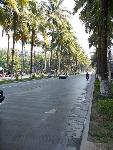
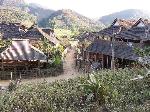
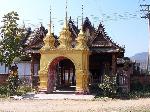
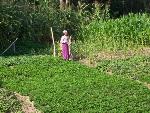
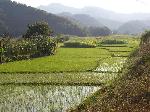
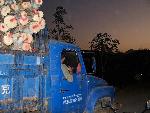
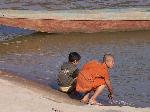
 Copyright © 1998-2026 All rights reserved.
Copyright © 1998-2026 All rights reserved.